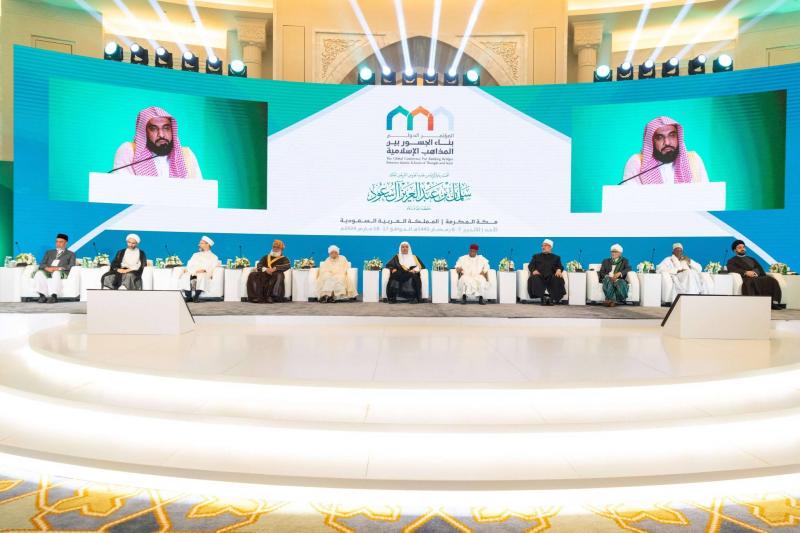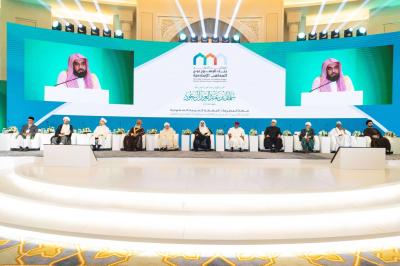A wide conference was held in Mecca by the Muslim World League, gathering Islamic scholars from various factions and sects to cooperate, show solidarity, eliminate sensitivities, and promote the values of moderation, tolerance, and unity while looking towards the future. These gatherings have become a commendable tradition that has formed a canopy in face of the challenges of division, estrangement, and extremism; especially concerning the statements, documents, and agreements for joint collaboration between institutions, aiming to clarify the darkness from the noble religion and restore tranquility, promoting values of peace, openness, and progress.
However, what I want to renew the discussion about is the general religious discourse and how it is being constructed amid numerous and dense changes. This is a significant matter that is being discussed daily. The primary tasks of religious scholars revolve around four key areas: advocating for the unity of creed and worship, religious education, issuing fatwas, and general guidance. The Mecca conference, along with similar conferences, specifically pertains to general guidance. The impact remains strong and significant in the first three areas: creed and worship, religious education, and fatwa; but it has diminished in the fourth area: general guidance.
Many entities in knowledge, media, communication platforms, and television channels now possess agendas to guide societies, shrinking the space that religious scholars occupy due to numerous challenges stemming from conflicting interests across various fields in knowledge and perspectives on the present and future. To clarify what I mean, I mention the challenges of confronting extremism and the challenges of dialogue with other religious and cultural entities in recent decades. There have been many difficulties, whether in confrontation or communication, due to a lack of knowledge and experience, as well as the changing times and world. It took tremendous efforts from individuals and institutions to open pathways after a period of closure, forming partnerships within the Islamic context and with worlds of religions and cultures. However, much work still needs to be done; nonetheless, as previously stated, opportunities have opened up because needs have become necessities, and our knowledge regarding them is continuously growing.
Currently, there are qualitative problems facing religious discourse that appears powerless or, to put it more precisely, bewildered. The Holy Qur'an instructs us in dozens of verses to perform good deeds and to command what is right and forbid what is wrong. It is implied that the concept of good is universal, or that we share with the world the understanding and discourse concerning it. At the forefront of the realms of good are major value-related issues connected to human life, ideas, and behavior. Central to these values is family life and family ethics, and the Qur'an places significant emphasis on these areas as well as on ethics in general.
Is there still a universal concept of good that can be defined and adhered to in our new societies and the world that now deeply influences every significant and minor aspect of our personal and collective lives? Do these significant changes leave room for a universal good, and how do we understand and confront the influences that invade our homes, families, childhood, education, and ideals of upbringing? I know that I am not stating anything new, nor am I discussing an unknown aspect from the perspective of the elite or the general public. What is evident is that we no longer possess a discourse or methods of understanding and conveying these issues.
Our discourse has now bifurcated: one part is rebellious, challenging, and condemning without proposing reasonable alternatives, while the other resorts to traditionalism, characterized by withdrawal, pessimism, yet holding onto stability, fully aware that it has been surpassed and largely confined. Governments and authorities have helped in stabilizing religious life, rituals, family life, smooth education, and the rights of women and children. However, religious scholars, both individually and institutionally, need to confront the public and address these changes that have altered the landmarks of good and evil.
Religion is a soft power, and its persuasive discourse is what holds value, not a protest discourse that neither fosters conviction nor produces satisfaction or tranquility. Changes are overwhelming us, and there is no way to confront them with a conspiratorial mentality. Just as we trained over recent decades to confront extremism and terrorism, in addition to embracing open and reasonable dialogue, we must continue our advancement in understanding these recent developments in their realities, facts, potentials, and their influence on the present and future.
The preparation to address the public, and compete with guidance and directing entities, necessitates an intellectual readiness regarding current developments and an understanding that enables us—if this term applies—to produce strategies that protect and initiate initiatives as we are part of this world, not intending to confront it but seeking to be and remain part of its peace, security, and progress.
Can deep knowledge and enlightened minds help us to jointly reshape the notion of “good” and its consensus, not just for the sake of protection but to create frameworks that uphold the humanity of our own beings and the humanity of the world we live in?
This is undoubtedly a major undertaking that religious scholars cannot accomplish alone. However, religious leaders play a significant role in the value and ethical domain. I do not claim that the issues of knowledge and understanding—whether shortcomings or denials—are confined to us alone; Muslims are about to make up one-fifth of the world's population, along with Catholics who are moving toward partnership with us. I was deeply affected by the family document issued by the Vatican in 2019 for its understanding, courage, and sense of responsibility.
Many among us and our friends are concerned about the hatred that continues to resurface among Arab and Muslim intellectuals towards the West—against the entire West! Hatred is impotence and misjudgment and does not help in confronting problems or engaging in the creation of new narratives, whether in religious or cultural discourse. We have spent nearly four decades fighting extremism and terrorism within our ranks and towards the world. We used to focus on the divisions in religion, considering the religious tradition as a protective shield.
However, this rampant shortcoming, which stems from grasping onto hatred, does not allow any room for hope in overcoming the impasse. There must be liberating knowledge, responsible will, and courageous initiatives. There is a necessity for a renewal of religious discourse aimed at redefining the notion of good and intersecting with the world, instead of rejecting and hating it. Renewing religious discourse is not just a position; it is a will and an initiative that must be realized today before tomorrow.




